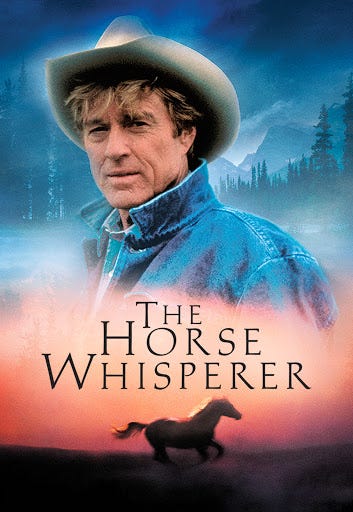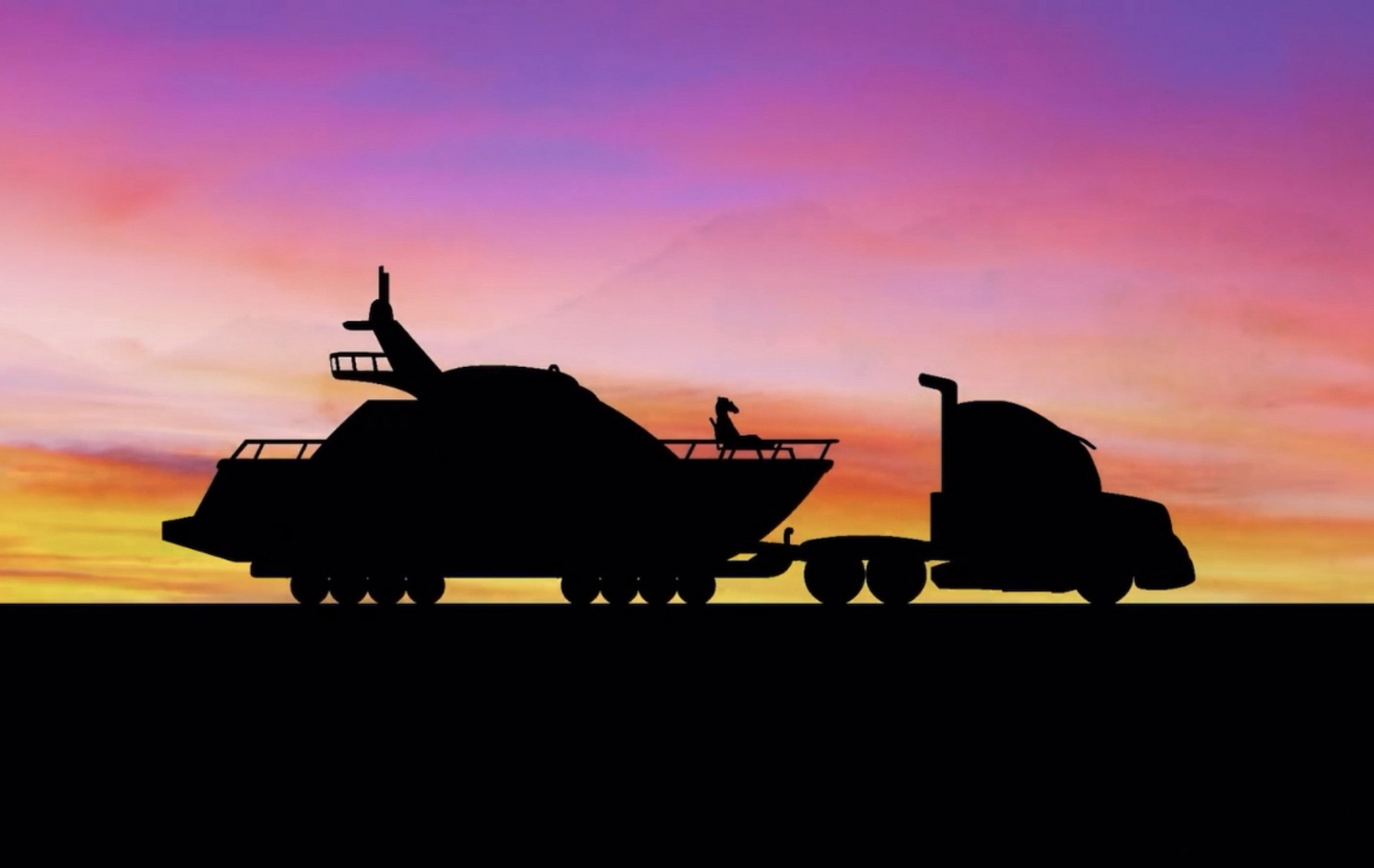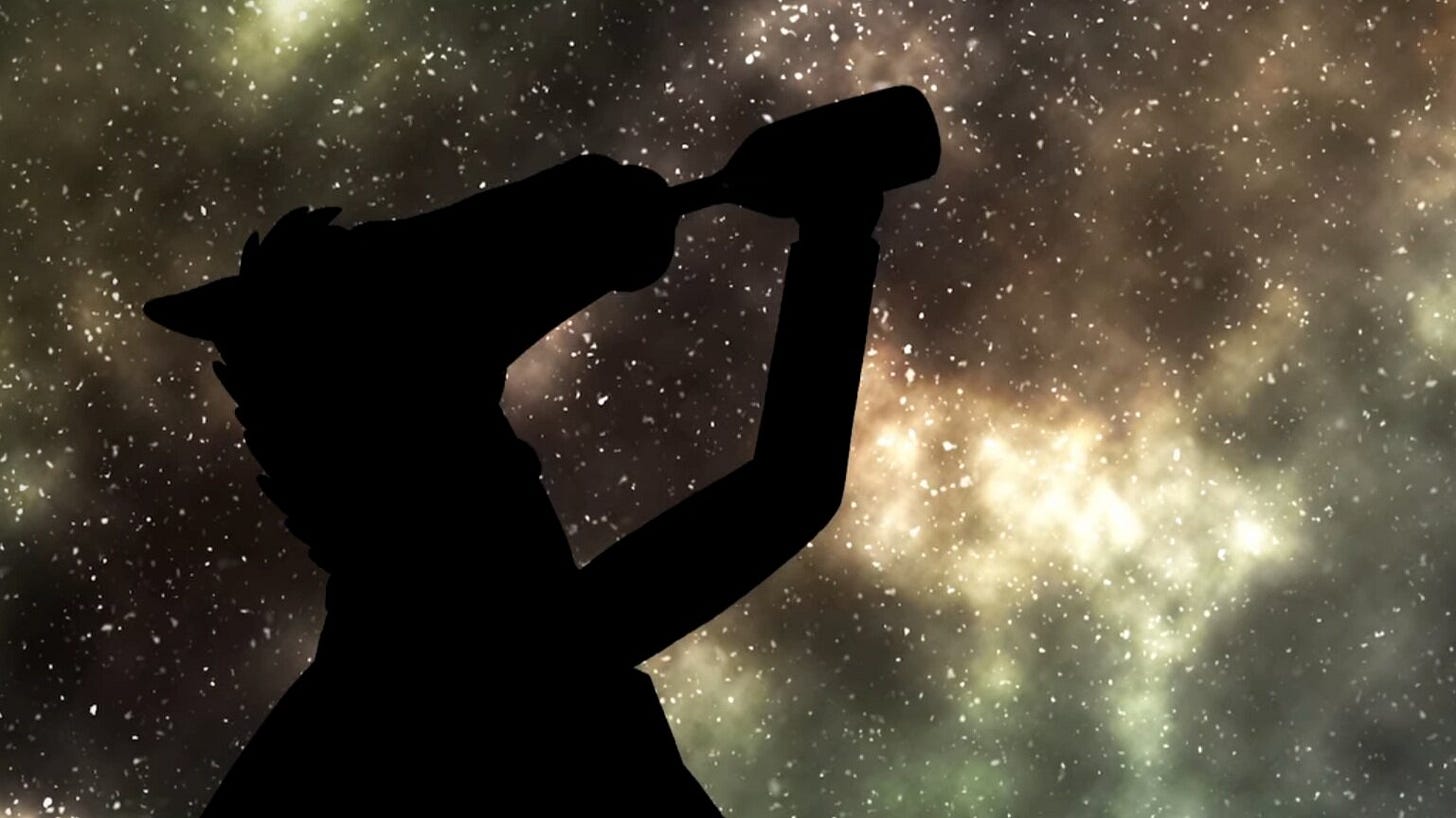BoJack Horseman's "Fish Out Of Water:" A Television Analysis
Intention or execution: what's more important?
“I don’t think I believe in ‘deep down.’ I kind of think all you are is just the things that you do.” - Diane Nguyen
What if this was true? What if, for one day, all you had to show for your character were your actions? BoJack Horseman’s “Fish Out Of Water” episode begs this question in a way that makes for quite an entertaining watch.
BoJack Horseman is one of the most perceptive shows of our time. It delves into the complexities of morality and what it means to be human (despite the plethora of anthropomorphic characters). It follows a binge-drinking horse(man) as he navigates life as a washed-up, 90s sitcom star.
Although the premise makes it sound like your run-of-the-mill adult cartoon, it tells an emotional story of an amoral horse’s journey to become a better one. I think this particular episode is a necessary step in his journey and let me tell you why.
The episode begins with Ana Spanakopita, BoJack’s publicist, reminding him that he needs to attend the Pacific Ocean Film Festival, or POFF, for his film, Secretariat’s, Oscar campaign because his words got him barred from all other major film festivals. BoJack’s main obstacles in the episode of learning to listen and be tactful of the people around him are introduced while he inconsiderately shoves his way through the airplane-esque submarine and explains why he was in the right in all of those instances instead of accepting the effect his words had.
For example, the reason why he was banned from Sundance was because he told Robert Redford, cofounder of the Sundance Institute and director of The Horse Whisperer, that the film was offensive because it portrayed horses as creatures who merely do as they’re told. While his aversion to this idea is understandable seeing as he has a headstrong personality, BoJack’s hatred of this film may run deeper.
The Horse Whisperer, released in 1998, was a film that faced backlash due to its generally inaccurate portrayal of horses. It made them out to be a species that can suffer drastic, adverse changes after a single traumatic event. However, these changes only happen if the trauma is continuous.
This ties into BoJack’s internal belief that no one understands his actions because they don’t know how terrible and abusive his childhood was. From his perspective, they’re committing the fundamental attribution error which is when people judge someone for their actions without considering what circumstances may have caused them to be that way. However, this mentality causes him to erroneously think that his trauma causes his immoral actions and, hence, he uses it as a crutch to support his poor decision-making. He would rather make excuses for his actions instead of taking responsibility for them, which he’s known to do.
The film also made the mistake of portraying horse rehabilitation as a quick process even though it takes time. This ideology is woven into BoJack’s arc as he doesn’t see any change in his personality no matter how hard he tries. BoJack’s belief that he’s condemned to being an eternally bad person is so deeply ingrained in him that he doesn’t even believe that he’s going to change. He fails to understand that change takes time and it doesn’t happen overnight.
Another thing that he fails to realize is that these mistakes were made due to the constraints of filmmaking which make it impossible for film and television to always be exact replicas of reality. Due to his time spent acting, BoJack often conflates his expectations of reality with that of fiction. This fatal flaw manifests itself as a warped sense of reality that has devastating effects on those around him, including himself, as seen in one of the previous episodes, Escape From L.A.
After his tirade, he states that he finds fish annoying as he’s sitting right next to a fish, among other offensive remarks. This prompts Ana to remind him to be wary of the cultural difference of the aquatic community, a comment which he swiftly brushes off. However, he takes her very seriously when she tells him that Kelsey, an old friend whom he got fired from the film he’s campaigning for, will be there. He quickly becomes reluctant to attend the festival and face his past so he tries to escape the… seacraft??? Unfortunately, he’s too late as the cabin has already been pressurized. He has to be tased due to his desperate attempts to leave the submarine in a hilarious ending to this scene. The submarine goes underwater and the cold open ends.
The importance of this almost fully silent episode lies in the cold open as it demonstrates BoJack’s overcapacity to talk but lesser ability to listen to and be tactful of his surroundings. This episode follows him as he learns to do the latter. It is an important step that BoJack needs to take in order to consider the effect his actions have on others and, hence, change his ways.
—
As he leaves the ‘seaport,’ he finds that his designated taxi driver is supposed to identify him by his coat and his weight. The taxi driver is quick to mock BoJack for his body, much to his dismay. This small moment is important because BoJack is given a taste of his own medicine and feels the weight of words. This small moment is important because, for the first time in the episode, BoJack is being subject to someone else’s vitriol and not the other way around.
BoJack arrives at his hotel room and starts searching for ways to pass the time until the Secretariat premiere. He picks up a magazine and opens it to find an article about Kelsey. Reminded of his shortcomings, he pulls out a flask from his jacket. Since he’s underwater, the liquid floats out and dissipates before his very eyes.
BoJack’s habit of drinking to hide from reality is similar to how he applies television logic to real life. In both cases, he would rather accept and indulge in warped perceptions than face reality head-on and see things for how they actually are.
He resorts to his second best option and tries to light a cigarette. A blank stare washes over his face as he hysterically realizes that this may not work either. He uses this habit as a way to punish himself for his mistakes when he can’t ignore them. This stems from a childhood event where his mother punished him for stealing a cigarette by forcing him to finish it; she said that she wasn’t punishing him for smoking or even stealing, but for simply being alive. Without his vices, BoJack is forced to face his guilt upfront, just like what he’s going to have to do when he inevitably meets Kelsey.
Next, BoJack tries the third best thing: good, old television. As he scrolls through the channels, he comes across an ad starring his unrequited rival, Mr Peanutbutter. The fantastical commercial is selling seahorse milk. Seeing that BoJack goes on to rescue a baby seahorse in this episode, the commercial stands as a comical nod to the running gag that Mr Peanutbutter always rips BoJack off and gets more of, or all of, the credit for it. BoJack grows bored and decides to leave his room and explore.
As BoJack steps out of his room, he sees Kelsey. He quickly retreats before she notices him. After this scare, he goes to the lobby which is crawling with press. He’s asked a question by an interviewer but, unfortunately, BoJack doesn’t understand their native tongue. BoJack responds with a thumbs-up which shocks the interviewer. Apparently, a thumbs-up is the aquatic equivalent to a profane gesture here on land that uses a different finger. Ana tried to warn him about this at the beginning of the episode but BoJack brushed it off. This is one of many examples where BoJack could have benefitted from taking the time to listen to those around him instead of being too caught up in his own conceit. Now, his Oscar campaign is at stake since a picture was taken.
—
“Kelsey, sorry you got fired. That sucks for you. P.S. We’re cool, right?” - BoJack Horseman
When BoJack works up the courage to apologize to Kelsey, he writes an apology note that is… subpar, to say the least. The name of the episode, “Fish Out Of Water,” refers to BoJack as he’s still inexperienced when it comes to the act of making amends with others and owning up to his mistakes. Fortunately, a crowd of sardines whisk him away before he’s able to give her the disgraceful note. He ends up on a bus and decides to take a nap.
He wakes up to find that only him and a seahorse are on the bus. Unfortunately for BoJack, the seahorse is in labor and asks for BoJack’s help with the delivery. He’s successful and they get off the bus. BoJack is kicked off because the bus is out of service. He finds that one of the baby seahorses has (literally) clung to him and isn’t willing to let go. It follows him and even begins to mimic him, which causes it to fall and start crying. He tries everything to make it stop; he even tries to give it a cigarette at one point, I kid you not.
BoJack then does little tricks to try and entertain it but it makes things worse. BoJack starts to understand that he’ll actually need to fix this problem and take it seriously instead of brushing it off. It’s only when an innocent baby copies his actions and hurts itself that he begins to understand that his actions have consequences and he needs to be responsible for them, hence he decides to take care of the baby and find its father.
The two have their fair share of zany misadventures on their way to the baby’s father. A moment that I found to be really cute was when they escape the taffy factory after being chased and BoJack is swimming across the sea but it looks like he’s flying like a superhero. It’s a small moment that shows the baby’s fondness of BoJack for taking care of him while his father couldn’t.
I think that’s another reason why this episode is so important. It’s essentially BoJack nurturing his damaged inner child. That’s why it has such a light-hearted tone. It’s supposed to be fun. BoJack didn’t want anything from the father when he returned the baby because this healing adventure was enough of a reward already.
—
“Kelsey, in this terrifying world, all we have are the connections that we make. I’m sorry I got you fired. I’m sorry I never called you after.” - BoJack Horseman
He finally wrote an apology note worth reading. It’s only when he had to let his tiny seahorse friend go that he realized the ethereal nature of human connection and why it makes it that much more important to treat those you care about with respect; his words actually matter. The difference between his initial note and this one is that this was actually written for her instead of as a quick fix to soothe his conscience. While it was messed up by the time he gave it to her, it truly is the thought that counts.
He’s late to the premiere but is greeted with praise when he enters his hotel. His film was well-received and people seem to have forgotten about his ‘thumbs-up’ mishap. This conveys how the good things we do for others can outshine the bad. This is BoJack’s recompense for his good deed.
I would be remiss if I didn’t take the time to acknowledge the sheer amount of visual gags in this episode. They were able to keep the comical tone of the series alive and well without any dialogue and that is quite the feat.
There’s something so genius about having an almost entirely silent episode in a series that shines, in part, due to its high volume of witty dialogue. This episode strips that away and leaves you to judge the characters only by their actions. In this case, it works in BoJack’s favor because he’s literally reuniting an abandoned child with his family. It’s selfless. However, if the rest of the show worked like that, it would emphasize how depraved of a person BoJack is because you’d never get to hear him lament about how he’s going to change or explain his childhood. There would be no room for pity. It would just be a man and his actions. This is what Diane meant when she said she did not believe in a deep down: no matter what we say, our actions are what define us. It was only when BoJack had his ability to speak taken away that he realized that, while words do matter, they have to be supported by actions.
I hope you enjoyed this in-depth analysis into an episode of my personal favorite series. It was really fun to make and I hope it was just as intriguing to read.











Yeah deep adult animation has some good stuff inbedded there. I'm watching Futurama s12 at the moment. Silly stuff but I always get flashbacks to science classes from the references. I don't know how I feel about that.
Guess I need to watch this show now. So much for all the writing I was going to do.